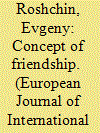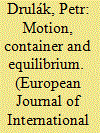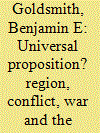| Srl | Item |
| 1 |
ID:
075744


|
|
|
|
|
| Publication |
2006.
|
| Summary/Abstract |
The present article seeks to draw attention to and explicate the concept of friendship in a discipline which has long ignored it: International Relations. It examines the ways in which major political thinkers and international treaties addressed the concept in the process of the emergence of the Westphalia state system. The article traces correlative changes between the shift from vertical to horizontal friendship and the emergence of internal and external princely sovereignty which signified the new era in international politics. It argues that the recognition of formally equal statuses of political friends prepared the grounds for the regime of external sovereignty. It also suggests that friendship was a key concept describing political order, included or not in the friend/enemy antithesis, in early Modernity. The subsequent ambiguity of the modern concept of friendship in international politics springs from its constant reinterpretation in the context of royalist and republican ideological polemics.
|
|
|
|
|
|
|
|
|
|
|
|
|
|
|
|
| 2 |
ID:
075741


|
|
|
|
|
| Publication |
2006.
|
| Summary/Abstract |
One of the most pressing problems confronting political scientists today is whether global governance has democratic legitimacy. Drawing on an analysis of the World Summit for Sustainable Development (WSSD) in Johannesburg in 2002, this article advances and empirically deploys an ideal-typical model of a new approach to key areas of global governance-'stakeholder democracy'. This work is located in the context of the changing practices of global governance, in which concerns about legitimacy, accountability, and participation have gained prominence. Sustainability is an arena in which innovative experiments with new hybrid, pluri-lateral forms of governance, such as stakeholder forums and partnership agreements institutionalizing relations between state and non-state actors, are taking place. A central argument is that sustainability governance imperfectly exemplifies new deliberative stakeholder practices with general democratic potential at the global level. In examining these governance arrangements, we draw together the nascent elements of this new 'model', such as its distinctive takes on political representation and accountability.
|
|
|
|
|
|
|
|
|
|
|
|
|
|
|
|
| 3 |
ID:
075742


|
|
|
|
|
| Publication |
2006.
|
| Summary/Abstract |
The study of metaphors in political discourse provides an excellent opportunity to introduce discourse analysis to theories of European integration and international relations. This article suggests a framework of analysis for linking the study of metaphors with these literatures. In a first step, the article connects the International Relations concepts of macro-structure, micro-structure and internalization with the analogous concepts of conceptual metaphors, metaphorical expressions and sedimentation as used in the study of metaphors. In a second step, it examines key metaphors used in discourses on the future of the EU. The empirical analysis suggests that the metaphors of MOTION, CONTAINER and EQUILIBRIUM OF CONTAINERS are the most significant discursive representations of the EU.
|
|
|
|
|
|
|
|
|
|
|
|
|
|
|
|
| 4 |
ID:
075743


|
|
|
|
|
| Publication |
2006.
|
| Summary/Abstract |
This article assesses the robustness of the liberal or 'Kantian' peace propositions by challenging two common practices: pooling data for different geographic regions, and using conflict at any level as a proxy for interstate war. The findings indicate that there are substantial differences between regions in the effects of democracy, economic interdependence, and international organizations. Conflict (all MIDs) and war have considerably different relationships to these key variables, and to each other, across regions. While I do not argue that these results undermine the general Kantian peace propositions, they do represent powerful qualifications that provide insight into theoretical foundations and raise related questions of specification error. They also point to the continuing importance of concepts such as security communities and norms as liberal factors distinct from the Kantian variables.
|
|
|
|
|
|
|
|
|
|
|
|
|
|
|
|